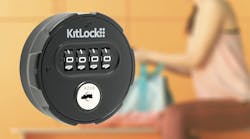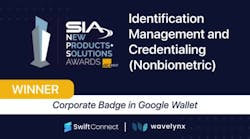PierPass Inc. has announced the scheduled rollout next month of its voluntary security program at the Ports of Los Angeles and Long Beach. The setup will use RFID tag on trucks to verify the identity of the truck, the driver and the trucking company before entry is allowed to all 12 terminals at the two facilities. PierPass is a not-for-profit company created by marine terminal operators at the Los Angeles and Long Beach ports to address multi-terminal issues such as congestion, security and air quality.
Under the TruckTag program, truck operators will obtain the first 10,000 tags purchased by terminal operators at no cost. The $1.2 million estimated cost of the program will cover the tags, their distribution, and the creation of a central security database for all terminals, PierPass says. It does not include the cost of RFID readers for the terminals, which runs from $1,200 to $1,400 each.
The system uses technology similar to the FasTrak and E-ZPass systems for automated toll collection, PierPass says. When a tagged truck is at the terminal point of entry, an electronic reader automatically scans the RFID tag. The truck driver simultaneously inserts his or her CDL into the reader to verify that they have authorized business at the terminal. Currently, each driver's CDL is verified by a security guard at the point of entry.
Marine terminals are required by law to ensure that only those with proper business at the ports are permitted entry. PierPass describes the TruckTag initiative as a "proactive approach" to meeting those port requirements.
Of the 10,000 available tags, over half of them have already been requested, according to Bruce Wargo, PierPass president & CEO. He expects that all of the tags will be distributed before mid-year, when the program is slated to be fully operational.
"It will eliminate the questioning and answering," Wargo said. "'Who are you' and 'who you drive for' questions may go away and I think that's a positive for them. Truckers have been fairly open to new things so long as it does improve their experience."
WhereNet, which manufacturers the tags, is installing the RFID readers at each terminal. Individual operators are responsible for install the tags inside each truck cab. Database company eModal, which already has 99% of the trucking companies working at the Ports registered to it, is responsible for building and maintaining the database.


